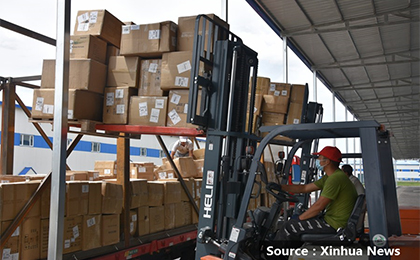



A staff member of the cross-border e-commerce company Sunny Express loads packages in Horgos, northwest China's Xinjiang Uygur Autonomous Region, June 3, 2021. [Photo:Xinhua/Gu Yu]
Cross-border e-commerce is forging a promising future for China's foreign trade, and the recent approval of more cross-border e-commerce comprehensive pilot zones has, undoubtedly, accelerated this trend.
Recently, China's State Council issued a guideline, approving the establishment of more cross-border e-commerce pilot zones in 27 cities and regions, including Erdos in Inner Mongolia and Yangzhou City in Jiangsu Province.
As a new form of foreign trade with great potential, cross-border e-commerce is still on its fast growth track.
-- Expanded pilot zones with regional characteristics and diversified development modes
In July 2021, the State Council issued the Opinions on Accelerating the Development of New Forms and Models of Foreign Trade, claiming that the country will speed up the construction of cross-border e-commerce comprehensive pilot zones.
In these pilot zones, local governments provide a variety of trade services ranging from logistics, payment, law, taxation and customs clearance to facilitate enterprises' cross-border e-commerce businesses.
The State Council had previously set up 105 pilot zones in 30 provincial-level regions, and this new batch of 27 added pilot zones brings the overall tally of pilot zones to 132, covering 132 cities and regions in China, said Hong Yong, associate researcher of E-commerce Research Institute with the Chinese Academy of International Trade and Economic Cooperation.
Currently, the pilot zones cover almost all provincial-level regions in China from coastal industrial powerhouses such as Guangdong, Jiangsu and Zhejiang to inland areas including Chongqing, which will play a more positive role in promoting high-level opening-up of the region, said Gao Feng, spokesperson of the Ministry of Commerce (MOC)。
As a new form of foreign trade with great potential and strong driving force, cross-border e-commerce is still on its fast growth track, said an official with the MOC.
-- Pilot trials boosting cross-border e-commerce
Since the southern Chinese metropolis of Shenzhen was approved as an comprehensive pilot zone for cross-border e-commerce in 2016, more than 1 billion parcels have been exported from the city with a total value of nearly 60 billion yuan.
In Shenzhen Qianhai Comprehensive Bonded Zone, multiple supervision patterns are conducted such as B2B direct export so that the goods under different supervision patterns are stored and distributed in the same warehousing area.
The pilot zones are able to adapt to different cross-border e-commerce trade patterns, and have brought new development opportunities to foreign trade enterprises such as goods and logistics services, which greatly improve the turnover efficiency of imports and exports, said Wu Haibo, chairman of Shenzhen Cross-border E-commerce Logistics Supervision Center Co., Ltd
In recent years, MOC has formulated many policies focusing on information sharing, financial services, logistics, credit, statistical monitoring and risk prevention as well as setting up online and offline platforms, and replicated and promoted nearly 70 mature experiences and innovative practices nationwide.
China's cross-border e-commerce has ushered in fast development and yielded fruitful results due to the pilot zones. Since 2017, the scale of China's cross-border e-commerce has grown by nearly ten times in five years.
-- Replicating and promoting experiences and practices
Taking advantage of the expansion of integrated pilot zones, Ningbo Discovery International Logistics Co., Ltd. is speeding up its layout of overseas warehouse.
Ningbo China Cross-Border E-Commerce Comprehensive Pilot Area was established in 2016. "Under the policy support of the pilot zones, we constructed overseas public warehouses to provide logistics services to cross-border e-commerce entities", said Zhou Jian, the general manager of the company.
The company has now established a total of 180,000 square meters of overseas warehouses with a daily handling capacity of over 50,000 parcels, providing professional and diversified logistics services such as maritime transport, air transport, and express delivery.
The newly expanded pilot zones include Jingdezhen City, east China's Jiangxi Province. "We hope to bring the advanced experience and practice of overseas warehouse to Jingdezhen, and provide the exporters with one-stop service combining warehousing logistics, overseas warehouse and path tracking to help more Chinese products going global", said Zhou.
MOC will help the newly established pilot zones to conduct businesses integrated local foreign trade situation and industrial development, said Gao.
Meanwhile, the pilot zones will improve the assessment and withdrawal mechanism to phase out unqualified ones, optimize the list of retail import goods of cross-border e-commerce, facilitate the return and exchange of goods and formulate guidelines on intellectual property rights protection.
Source: <https://eng.yidaiyilu.gov.cn/qwyw/rdxw/233919.htm>
Edited by Jiang Feifan